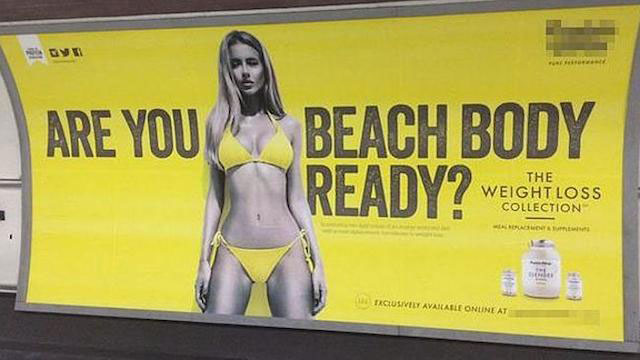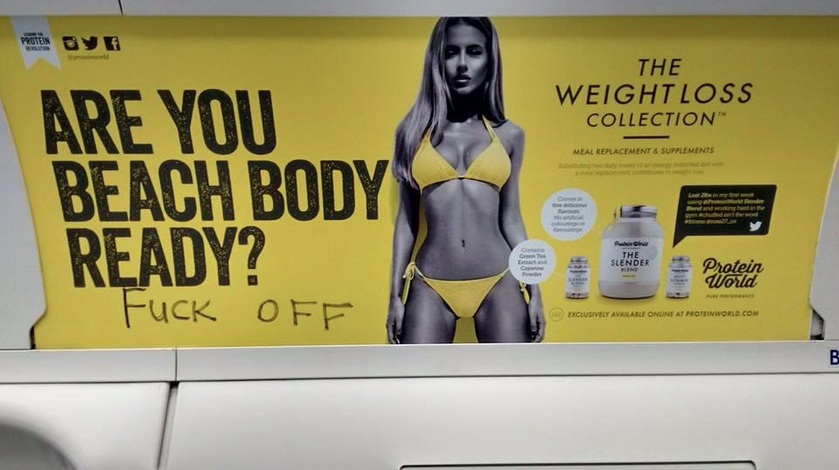 |
| Photo courtesy of Change.org |
The 74 billboards include a male and female version, but only one of the swimsuit models has inspired a backfire that reverberated across the internet like a barbell hitting the floor. Can you guess which one?
With debates from supporters and opponents overflowing on the web, both parties fail to engage in the only discussion worth having: Everyone is wrong.
PROTEIN WORLD PROMOTES DECEPTION
The health and fitness market in particular relies on copywriting sleuth to attract its target consumer. Companies like Protein World neglect the science of true health and longevity and replace it with gimmicks allowing users to "get fit quick."
The spotlight product, Protein World's "Weight Loss Collection," touts numerous miracle qualities including:
- Helping users "lose weight, fast"
- Boosting metabolism and burning fat
- Encouraging "lean and toned muscle growth"
- Whey protein -- Derived from milk, athletes most often use the powder out of convenience to meet their daily protein goals. Users often mix one serving with milk, water or juice to create a protein shake or meal replacement shake. Protein in itself does not promote weight loss. It does, however, take the body longer to digest, leaving less room for hunger to creep in. Protein also feeds muscle tissue, helping dieters retain as much muscle as possible.
- Energy pills -- Stimulants like caffeine, guarana and green tea extract promote increased physical activity that, when habituated, may then lead to significant weight loss.
- Multivitamin -- Evidence for use multivitamins is flawed. An article published in the Annals of Internal Medicine in 2013 found that "supplementing the diet of well-nourished adults with (most) mineral or vitamin supplements has no clear benefit and may even be harmful."
OPPONENTS PROMOTE IGNORANCE
The body acceptance movement often uses ads like these as campaign platforms. A Change.org petition with over 70,000 signatures to date hopes to remove the, claiming it forces others to "feel physically inferior to the
unrealistic body image of the bronzed model, in order to sell their
product".
Arguments against Protein World took two forms: acts of civil protest encouraging body positivity and then this, found on Twitter:
 |
| Comment reads: "Stop encouraging women to starve themselves." |


Negative outbursts like these discredit the fitness community to which Protein World directed this advertisement.
Model, fitness enthusiast and vegan Renee Somerfield said she believes in body positivity but doesn't support the backlash inspired by her bikini billboards. " I work very hard and live a healthy and active lifestyle which is why
Protein World chose me for their campaign," Somerfield said in an interview with HuffPost UK. "I couldn't work every day as a
full time model by starving myself, dieting or not looking after my
body. Nourish your body, be kind to it and it will love you right back,
no matter your size," she says.
The company's chief executive Arjun Seth labeled the vandals a "minority" group of "terrorists" and defended the controversial campaign, calling it "aspirational."
"TWO WRONGS DON'T MAKE A RIGHT."
Somerfield hit the nail on the head when she said, "Two wrongs don't make a right." Deceptive advertising corrodes consumers' relationship with their health, and hostile comments sabotage the pride those same people earn after weeks, months or years of fitness transformation.
British body image consultant Nick Hutchinson said, "It's all part of the same thing, this obsession with women's appearance."
Is the fight for body positivity in media a never-ending battle? Share your thoughts below!
No comments:
Post a Comment